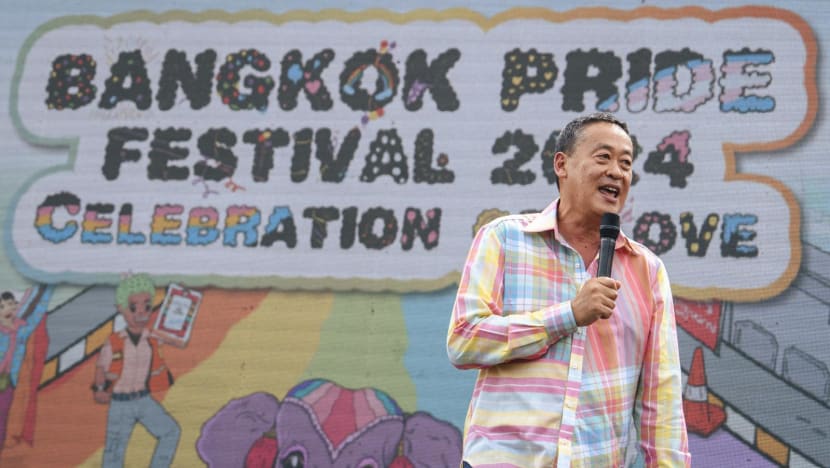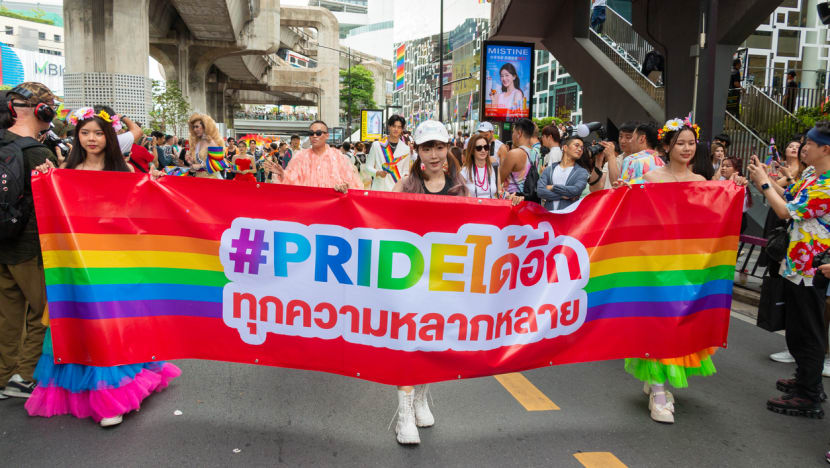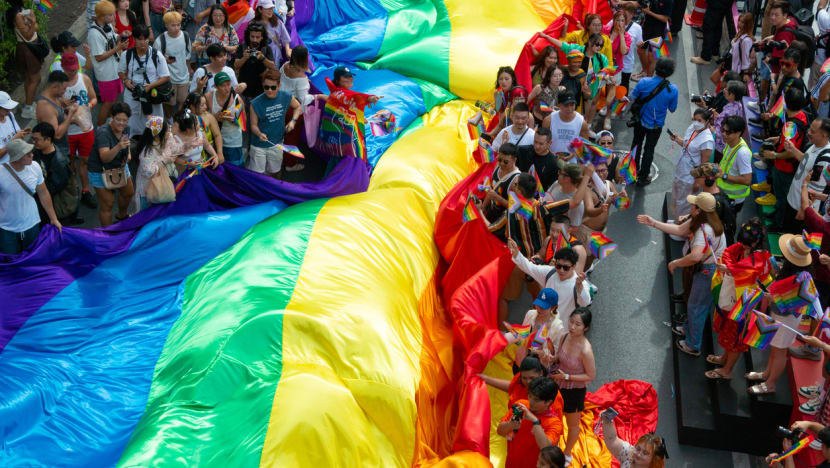Economic waves and 'rainbow washing': Thailand’s same-sex marriage Bill brings business opportunities and challenges, say experts
The anticipated final approval of Thailand’s same-sex marriage legislation is expected to cement the kingdom’s place as a regional generator of lucrative economic opportunities, driven by the LGBTIQ+ community.

Thailand's Prime Minister Srettha Thavisin addresses members of the LGBTQIA+ community during a pride event in Bangkok on June 1, 2024. (Photo: AFP/Chanakarn Laosarakham)

This audio is generated by an AI tool.
BANGKOK: Thailand’s recent move to enshrine legal protections for the lesbian, gay, bisexual, transgender, intersex and queer (LGBTIQ+) community has put it on the cusp of a possible rainbow economic wave, and also given the kingdom a competitive edge in the region, according to experts.
The country’s marriage equality Bill cleared final approval by the Senate in June, meaning it only needs to be given royal endorsement and be published in the royal gazette to become law 120 days after publication.
Thailand will become the first Southeast Asian nation - and follow Nepal and Taiwan in the wider Asia region - in passing such a law. The first same-sex marriages could take place by the end of the year.
“I can't overestimate what an advantage that will be,” said Mr Todd Sears, the founder and CEO of Out Leadership, a global platform used by businesses to drive equality.
“Being a leader in this space is going to provide benefits that I don't think people necessarily even think of. There'll be a lot of knock on benefits that are ancillary to marriage,” he said.
The Bill removes gender-specific terminology from the country’s marriage law. For example, references to husband, wife, men or women are to be replaced by gender-neutral terms, such as spouse and person.
It also affords same-sex couples equal rights when it comes to child adoption, healthcare and inheritance.
It leaves Thailand well poised to ride a rainbow economic wave, as it eyes increased tourist spending, talent from new demographics and locations, soft power export opportunities and a more welcoming business and investment environment, fuelled by this latest development.

TOP TALENT AND EQUAL TREATMENT
Long considered a welcoming destination for the gay community, taking the steps to enact this new legislation will enhance Thailand’s reputation and give global businesses that need to prioritise diversity and inclusion the certainty and confidence to invest in Thailand, Mr Sears said.
Making the law change now will open a pipeline of new talent and economic opportunity, as well as making existing workplaces more productive, he added.
“As companies think about where they want to expand and where they can bring top talent, this does matter.
“Companies have focused on diversity inclusion for 25 years, not because of the moral case, but because they know that it's delivered them innovation and talent, and that hasn't gone away,” he said.
“LGBT people are the canary in a coal mine for a broader culture or a society. So what you do to treat an invisible, often smaller minority that is persecuted globally, sends a message to how you treat all people.”
He cited studies by the US-based Williams Institute that showed an increase in a variety of economic factors once same-sex marriage was legalised and workplaces better reflected the diversity of society.
“Every single economic indicator that you could imagine was positive. All of those things will be true for Thailand now that they're doing this, especially from a talent attraction perspective, from an innovation perspective,” he said.
When the LGBTIQ+ members of a workplace are excluded from full participation, discriminated against or denied promotion opportunities, naturally the productivity of those companies was less than optimal, he explained.
Before this, the law had not kept up with prevailing community attitudes. A poll in June carried out by North Bangkok University found that 82.5 per cent of people supported the government’s campaign to enact marriage equality.
However, there are still gaps in protection for LGBTIQ+ workers in Thailand’s business environment.
Despite public support for more inclusive laws and policies, the country has previously faced challenges enacting legal protections. A United Nations report in 2019 entitled “Tolerance but not Inclusion" documented the “persistent experiences of stigma and discrimination, violence and exclusion” faced by the community.
It found most LGBT respondents perceived stigma and reported experiencing at least one form of discrimination, which may limit employment opportunities. Less than half of respondents had heard of Thailand’s Gender Equality Act, which was passed in 2015 to protect individuals from gender-based discrimination.
Ten per cent of LGBT people and 32 percent of transgender women reported discrimination in their current or most recent job, the report stated.
The marriage equality Bill will not solve those issues, but could help maintain momentum already present in the corporate sector to make workplaces more diverse and fair, said Mr Jhitsayarat Siripai, an assistant professor in gender and the media at Rajamangala University of Technology.
The state has been slower to move in this space, Mr Jhitsayarat said, and the private sector has already proven to be proactive in promoting products such as same-sex couple health insurance.
“We have seen a lot of the private sector in Thailand start to recognise and respect LGBT people in the workplace and campaign for equality in the workplace,” he said.
“Things that I would like to see after this are labour regulations to recognise LGBT people in terms of health and wellbeing in the office because they still face social intolerance, violence, discrimination and a lack of opportunities to be promoted.”
Both experts said the Thai government and corporations needed to squarely balance acting for the good of society and pragmatism about business opportunities that may now present.
Throughout Bangkok Pride - a month-long celebration of LGBTIQ+ culture and community that is marked around the world in June - a broad assortment of companies were keen to position their brand closely with the social cause. Japan Airlines, EVMe and Agoda were among the official sponsors of events.
“It's a trend and they want to capture the young generation who have the potential to make profits for their company. So that's why it’s a win-win situation, society tick, and also the company tick,” Mr Jhitsayarat said.
Companies should rightly “celebrate this win” and take advantage of the benefits to their business but at the same time examine their own policies.
“Rainbow washing” - showing superficial support for the LGBTQ+ community, without taking any real concrete action - is a real risk though and companies should be scrutinised on what they do to protect and advocate for their employees for the other 11 months of the year, Mr Sears said.
“How are they treating their LGBT employees? What are they doing to support the community? What are their policies internally? Do they have non-discrimination? Are they actively advocating for LGBT civil rights? If that's the case, then it's not rainbow washing,” he said.
Mr Sears added that Gen Z - the demographic cohort born between the late nineties and 2010, succeeding millennials - are not only becoming more prominent as employees within companies but are generally showing they care deeply about diversity, inclusion, equality and the climate.
Governments and companies that respond to those demands will benefit greatly, he said.
A 2024 US study by the Public Religion Research Institute found that nearly 30 per cent of Gen Z adults identify as LBTIQ+, far higher than any other demographic - the second highest was millennials at 16 per cent.
In Thailand, Gen Z was estimated to make up one-fifth of the total population in 2019, according to the National Statistics Office.

ONE STEP AHEAD
For Mr Murat Uzel, seeing Thai Prime Minister Srettha Thavisin involved in this year’s Pride parade and waving a rainbow flag on the streets, was not rainbow washing, but a watershed moment that showed Thailand was serious about inclusivity.
“It's amazing. It helps Thailand a lot. Thailand has always been a very popular destination for the gay community. I think it's going to get bigger and better,” he said.
Mr Uzel is the founder and designer at MP Experiences, a luxury destination management company based in Thailand. He estimates that 20 per cent of his clientele are from the LGBTIQ+ community. The market is a burgeoning one.
Globally, Thailand ranked third for total revenue and the highest in the world in terms of the percentage of its GDP coming from LGBT tourism - at 1.23 per cent. Given that the community constitutes about 10 per cent of global travellers, there are huge opportunities for more growth.
“Passing this law in Thailand is adding a great image to Thailand's global marketing strategies and probably its overall image globally,” he said.
“When you look at the regional competitors, Thailand is always one step ahead. Thailand is really supporting gay tourism, and promoting Thailand as a gay destination. That's a big thing.”
“And it's not only for the gay community. Once a destination is gay friendly, other people also feel comfortable as well. You don't have to be gay to support the gay community or gay travel. This is the human rights thing,” he said.
A 2023 report by LGBT Capital - a corporate advisory and asset management business - estimated that revenue from gay international travel and tourism was worth US$6.5 billion to the Thai economy in 2019, before the COVID-19 pandemic impacted the industry.
Since 2019, Thailand’s tourism authority has actively targeted the demographic with its Go Thai Be Free campaign, which promoted the country as a diverse and welcoming destination for LGBTIQ+ travellers.
“I think that was a good idea. This group has a very high potential, they typically have a higher income and they are considered quality tourists. So it was a good opportunity,” said Ms Piyachat Puangniyom, an expert on hotel management at Kasem Bundit University.
There might be more economic potential to untap, if the government and private sector continue to prioritise diversity and openness in the tourism sector, she said.
“For the LGBT group, I think if the government tries to promote more and let them feel that they are very important for us, they will want to come and spend their time here, because they have the positive image in their eyes already,” she said.
The “gay dollar” remains lucrative, and businesses and the government alike will continue to chase it, said Mr Blue Satittammanoon, producer and founder of White Party Bangkok, Asia's largest gay New Year's dance festival.

That has been evident in the amount of corporations keen to be involved in Thailand’s Pride celebrations throughout the month of June, he noted.
“I feel like people really got on board with Pride. I don't know if they actually truly support it or if they see the value in the gay dollar. But I can see why the corporates want to get involved,” he said.
“There's the economic incentive, but also, I think just the way that Thai people are in general, we are hospitable and we welcome everyone and that’s ingrained in our culture. Thailand gets it.”
He said he does not think that the law will necessarily draw more people to Thai events, but rather cement its place as a gay-friendly destination.
“I feel we're already there. But having that law passed feels like the cherry on the cake,” he said.

SOFT POWER POSSIBILITIES
The true opportunities may lie with the soft power projections that events like White Party aspires to deliver beyond Thailand. The event is already geared to launch in Vietnam and South Korea this year.
Mr Blue said he would welcome more government support for homegrown gay events, to not only attract more high-end talent to Thailand, but also give them a boost overseas. He likened the strategy to the Singapore government incentivising pop star Taylor Swift to perform there exclusively this year.
“I want to see Kylie (Minogue) here in Thailand, at White Party Bangkok. That’s my dream,” he said.
“It's actually soft power. Last year we welcomed more than 32,000 people from 93 countries, from all over the world, flying to Bangkok to spend money. We calculated and they probably delivered like 600 to 700 million baht (US$16.3 to 19m) to the economy.”
Beyond events, Thailand has carved out an increasingly lucrative popular entertainment niche, through the production of its Y series, or “boys love” television dramas.
The series - which typically have queer love storylines - have grown to become part of mainstream Thai broadcasting and given rise to what has become known as the ‘Y Economy’.
The total market for the genre is estimated by Thailand's Department of International Trade Promotion to be worth more than 1 billion Thai baht, including overseas opportunities for commercial filming, fan events and related tourism.
The genre is highly popular in Indonesia, the Philippines, Taiwan, Japan and increasingly Latin America, giving production companies an opportunity to profit from licensing their programmes on streaming platforms globally.
The marriage equality Bill consolidates Thailand’s reputation as an accepting place, which gives the industry more strength to promote itself, according to Mr Krisda Witthayakhomjornet, the CEO of Be On Cloud, a major production studio that has created a raft of successful Y series content, including action romance drama KinnPorsche and historical mystery drama Man Suang.
“It might make people feel that this is our country’s strength. Everything seems to make sense now. This (marriage equality Bill) is a product of everyone’s hard work and we are part of it, which made me happy,” he said.
He said his programmes deliberately incorporate “Thainess” - costumes, food, music and culture - into them, further entrenching soft power possibilities. By law, that will also soon extend to marriage equality.
“In the past, in entertainment there was only one place for gay characters, which was a comical one. I remember that if you saw people of the same gender holding each other’s hands, they would be condemned,” he said.
“To create good content now, the characters represent normalcy and show that this kind of love is normal.”
It was Y series programmes that got Mr Paolo Rodriguez, a UX Designer from the Philippines and based in Singapore, into wanting to further explore Thai queer culture - and spend his time and money in the kingdom.
He unintentionally attended Bangkok Pride last year, the first time the parade and celebrations were held following a 16-year hiatus.
“Last year was the first time I saw everything was rainbow and super fun, colourful, vibrant, exciting. It feels safer to be yourself in Thailand,” he said.
He said that knowing the law protected the gay community was a positive step and one he hoped would be replicated in future in other parts of Southeast Asia.
“It makes me very proud that Thailand is pioneering queer rights in this part of the world, since growing up a lot of visible queer history-making was always very distant, mostly in Western countries,” he said.
“It's great to see it in our own neighbourhood.















